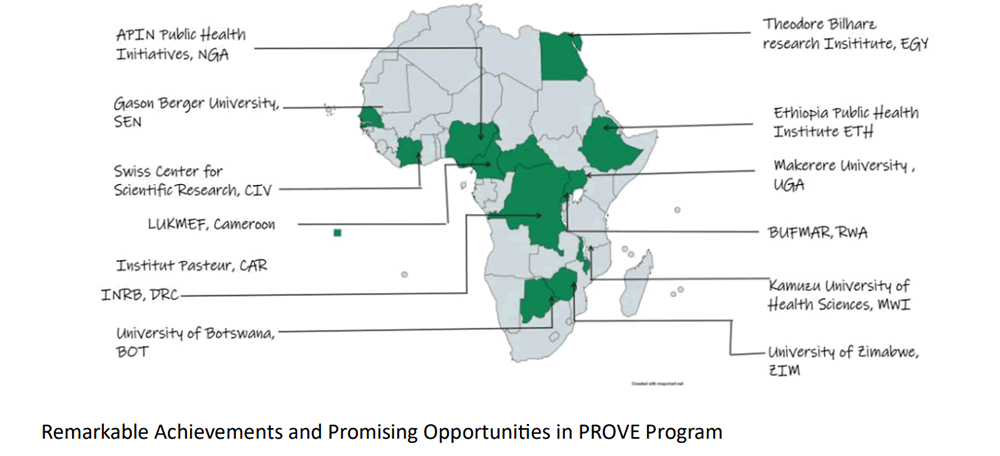Background.
The Program for Research on Vaccine Effectiveness (PROVE) was established in 2022 as a component of the Saving Lives and Livelihoods (SLL) program. This is a joint effort between the Africa Centres for Disease Control and Prevention (Africa CDC) and the Mastercard Foundation that aims to evaluate the effectiveness of COVID-19 vaccines in real-world situations across Africa.
PROVE is being implemented in 15 African nations by the Infectious Diseases Institute (IDI) in partnership with the African Forum for Research and Education in Health (AFREHealth) and the National Institutes of Public Health (NIPHs) of the member states of the African Union (AU). It uses the NIPH-academic/local partnership model and has a capacity-building objective to improve data management and implementation science in the different AU member states.
The program seeks to utilize existing resources and foster an environment of mutual collaboration to facilitate the rapid translation of research into practice and policy. Currently, PROVE is being implemented at multiple levels in 13 AU member nations.
Strategy
Under the primary mandate of the program, the team uses research methodology to address three critical questions that need to be answered as part of the National COVID-19 response in Africa. These questions are:
1. How effective are COVID-19 vaccines in the African population?
2. What are the factors that influence healthcare workers' decision to get vaccinated?
3. How has the pandemic affected national health programs in Africa?
Under the guidance of Africa CDC, a team has developed a research protocol that was reviewed and approved by Africa CDC. Participating countries then customized the protocols with investigators' help from national public health institutes and submitted them for approval to local ethics and regulatory bodies. A centralized data management platform hosted at Africa CDC was created to ensure consistency across all study sites. This approach allows for country ownership, contextualization of research findings,
and data harmonization for comparison.
Scope and coverage
As of May 2023, the program is operational in 13 AU member states, including Senegal, Cote d'Ivoire, Nigeria, Egypt, Ethiopia, Uganda, Rwanda, DRC, CAR, Cameroon, Malawi, Zimbabwe, and Botswana.

The PROVE program has achieved significant milestones in its early implementation, paving the way for a brighter future in health security across Africa. Here are some of the notable successes that demonstrate the program’s effectiveness:
1. Research Implementation: Eleven implementation sites have successfully undergone the protocol customization process and initiated contact with local research and ethics committees for review. Data collection is already underway at seven sites, and preliminary results have been obtained from activities in Uganda, Malawi, Nigeria, Zimbabwe, and Ethiopia. These initial findings serve as a testament to the program’s efficacy and potential for generating valuable insights.
2. Advocacy and Networking: The PROVE program has played a pivotal role in advocating for the establishment of a continental network that would function as an academic consortium on health security in Africa. The success of the pilot collaboration between academic institutions and ministries of health has been shared at the PROVE launch meeting in Harare, Zimbabwe, in August 2022, and at the second conference of public health in Africa meeting hosted in Kigali, Rwanda. Such recognition highlights the program’s contribution to advancing the field of health security and fostering collaboration among key stakeholders.
3. Continental Research Agenda: The Africa CDC has extended an invitation to the PROVE consortium partners, AFREhealth and IDI, to participate in a research agenda-setting meeting for the entire continent. This demonstrates the high regard and recognition the PROVE program has garnered, positioning it as a leading voice in shaping research priorities in Africa. It is a testament to the program’s potential to influence policy and contribute to evidence-based decision-making.
4. Dissemination and Knowledge Exchange: The PROVE program has proactively disseminated its preliminary research findings through online communities of practice, which are jointly hosted by the Africa CDC and the infectious diseases institute. These monthly scientific engagements provide a platform for sharing outputs from research implementation across African Union member states. By engaging with other Africa CDC partners in the saving lives and livelihoods program, as well as other scientists in the consortium supporting various sites, the program facilitates valuable knowledge exchange and collaboration.
5. Training and Capacity Building: Recognizing the importance of enhancing data harmonization and implementation science during public health emergencies, the PROVE program has planned two capacity-building trainings. Agreements have been forged with the Africa Population and Health Research Center and the University of California San Francisco to deliver certificate courses primarily to staff embedded in national public health institutes. These courses aim to build the capacity of participants in data analytics and the utilization of data for informed decision-making in times of public health crises.
Looking ahead, the PROVE program is poised to make further strides in the field of health security. It is scheduled to share additional outputs from program implementation at the upcoming 6th Annual Africa Health Symposium in Maputo, Mozambique, in August 2023. With its impressive track record of early successes, the PROVE program is primed to contribute significantly to safeguarding the health and well-being of the African continent.





